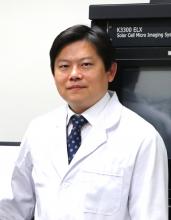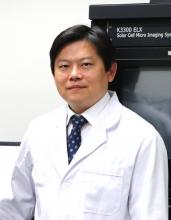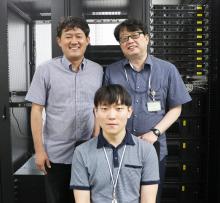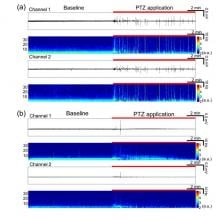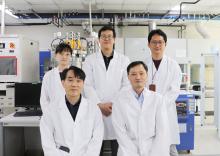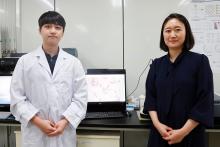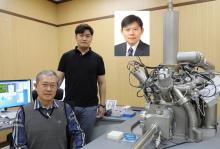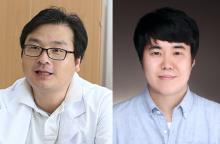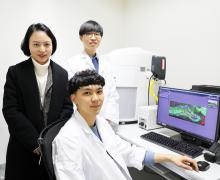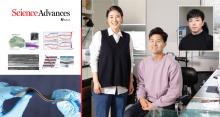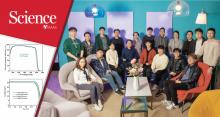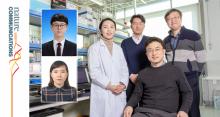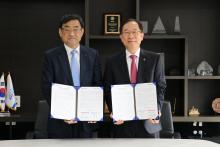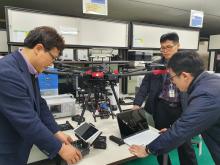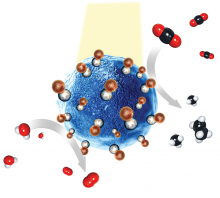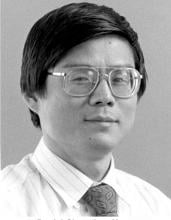South Korea
News
14 Sep 2020
Scientists at Daegu Gyeongbuk Institute of Science and Technology, Korea, show that it is possible to distinguish between left-handed and right-handed people by noninvasively monitoring just their brain activity during passive tactile stimulation. These results are key in haptic research (the study of sensory systems) and have various important implications for brain–computer interfaces, augmented reality, and even artificial intelligence.
09 Sep 2020
Scientists at Daegu Gyeongbuk Institute of Science and Technology, Korea, develop a novel “heterostructured” photocatalyst using titanium and copper, two abundant and relatively inexpensive metals. Their cost-effective synthesis procedure, coupled with the high stability of the photocatalyst, provides an economically feasible way to convert waste carbon dioxide and water into useful hydrocarbon fuels using endless sunlight.
04 Sep 2020
Scientists at Daegu Gyeongbuk Institute of Science and Technology (DGIST) in Korea have found a way to improve the efficiency of betavoltaic devices, a type of power source that uses an internal radioactive material. This study opens up a new horizon in the field of nuclear batteries for powering set-and-forget electronic devices.
25 Aug 2020
A research team led by Prof Jeongho Kwak from Daegu Gyeongbuk Institute of Science and Technology (DGIST) has designed a novel system architecture where collaboration between cloud service providers and mobile network operators plays a central role. Such a collaborative architecture would allow for optimizing the use of network, computing, and storage resources, thereby unlocking the potential of various novel services and applications.
20 Aug 2020
The ever-increasing workload of data centers calls for new ways to store and access data. Researchers from the Daegu Gyeongbuk Institute of Science and Technology, Korea, have developed a new approach to manage databases in solid state drives, providing marked performance improvements in read/write delays and offloading database computation tasks from CPUs to increase efficiency and reduce power consumption.
11 Aug 2020
Scientists from the Daegu Gyeongbuk Institute of Science and Technology, Republic of Korea, discover a new way to diagnose Alzheimer’s disease by analyzing the levels of specific proteins in nasal discharge. This simple and inexpensive method could help in timely diagnosis of Alzheimer’s disease, in order to start treatment as soon as possible, thus delaying disease progression.
13 Jul 2020
Acute kidney injuries can sometimes trigger the deterioration of small blood vessels and capillaries, leading to chronic kidney disease. But, this process is not completely understood. Now, for the first time, researchers from Daegu Gyeongbuk Institute of Science and Technology, Korea, in collaboration with teams from the University of Pittsburgh and University of Pittsburgh Medical Center, USA, have successfully used ultrasound super-resolution (USR) imaging to observe this process in live mice, revealing the promise of USR as a powerful diagnostic and research tool, and enhancing understanding of the disease.
09 Jul 2020
Scientists in Korea explain a new process that maximizes photon conversion in 2D materials, which could innovate photonic-based applications
29 Jun 2020
Novel system for simultaneously measuring brain electrical signals from multiple zebrafish opens up path to cheaper and faster drug screening for neurological disorders
25 Jun 2020
Most common thin-film solar panels consist of expensive rare-earth elements like indium and gallium, or highly toxic metals like cadmium. Environment-friendly solar panels consisting of the abundant materials Cu, Zn, Sn offer attractive alternatives, but are hindered by their low practical efficiency compared to their theoretical potential. Researchers from DGIST have now discovered a way to overcome these hurdles.
10 Jun 2020
Metal-organic frameworks (MOFs) are sponge-like organic-inorganic hybrid materials and have a variety of uses due to their ultra-high “porosity,” or the ratio of pores or air pockets to the solid material. Through a technique called “post-synthetic modification,” Professor Jinhee Park and her research team were able to enhance and modify the function of these materials for specific purposes.
03 Jun 2020
Scientists from the Daegu Gyeongbuk Institute of Science and Technology, Korea, develop a novel silica-based cathode for lithium–sulfur batteries, thereby enabling the realization of batteries that can last for over 2000 charge/discharge cycles. The possibility of successfully using the unconventional silica could spark a paradigm shift in rechargeable battery designs.
18 May 2020
Researchers from Daegu Gyeongbuk Institute of Science and Technology develop a simple approach for controlling the otherwise random formation of cracks in flexible thin-film conductors, greatly increasing the durability of flexible electrodes and transistors against bending and folding.
12 May 2020
Researchers from Daegu Gyeongbuk Institute of Science and Technology(DGIST) have developed an innovative method that allows them to visualize up to tens of different proteins simultaneously in the same cell. This technology could help scientists elucidate the complex protein interactions involved in degenerative diseases such as Alzheimer’s, deepening our understanding of their mechanisms and allowing for early detection and treatment.
06 May 2020
Scientists are finding safer ways to keep drug-loaded microrobots attached to cancer tissue.
10 Apr 2020
A technology to further accelerate the commercialization of Colloidal Quantum Dot(CQD) Photovoltaic(PV) devices, which are expected to be next-generation photovoltaic devices, has been developed.
31 Mar 2020
Principal Researcher Soon Moon Jeong at DGIST developed in-plane electro-luminescent(EL) technology that inserts electrodes into a luminous layer
19 Mar 2020
Environmental changes trigger tiny RNA segments to modify plant pores involved in photosynthesis.
03 Mar 2020
DGIST joint research team identified the roles of 'Somatostatin,' which mediates the functions of GABAergic synaptic protein
23 Feb 2020
South Korea's Ulsan National Institute of Science and Technology (UNIST), in collaboration with POSTECH, have developed a new biomimetic ‘moving’ surface, inspired from the biomachanics of the pectoral fins of the Batoidea.
20 Feb 2020
A recent study, affiliated with South Korea's Ulsan National Institute of Science and Technology (UNIST) has engineered the light-absorbing layer material with the new composition of perovskite material and applied it to the solar cell.
20 Feb 2020
A recent study, affiliated with South Korea's Ulsan National Institute of Science and Technology (UNIST) has unveiled a novel biomass conversion technology that can turn forestry biomass residues (i.e., sawdust from timber logging) into higher value fuels and chemicals.
18 Feb 2020
- Participants of 'International SYNAPSE Project', DGIST & POSTECH sign an MOU to build a joint cooperation system
14 Feb 2020
DGIST Professor Cheil Moon’s research team identified the molecular mechanism of innate olfactory behaviors. Clarified sensory defect accompanying neurodevelopmental disorder and cancer; will contribute to early diagnosis and improving anti-cancer drug side effects
29 Jan 2020
The technology analyzes water quality with drones and artificial intelligence to predict the level of algal bloom.
13 Jan 2020
Analysis of the Nomura’s jellyfish genome has identified unique genetic adaptations that helped them become early, successful multi-cellular predators.
13 Jan 2020
DGIST startup 'N-Side' to showcase the products applying graduate students' research findings in 'CES 2020'. Presented a smart necklace to commune with pets using a wireless sensor.
12 Jan 2020
The design boosts the image appeal of LCD-generated holographic scenes while retaining the popular flat-panel format.
10 Jan 2020
A material aims to deliver a one-two punch: recycling atmospheric carbon dioxide for the production of more sustainable hydrocarbon fuels.
Events
Sorry, no events coming up for this topic.
Researchers
Sorry, no researchers coming up for this topic.
Giants in history
Hwang Hye-seong (5 July 1920 – 14 December 2006) was an expert on Korean royal court cuisine, the knowledge of which she dedicated her career to keeping alive. Formerly an assistant professor of nutritional science, Hwang met the last kitchen court lady in the Joseon Dynasty Han Hui-sun and, from her, learned about the culinary traditions of the royal court.
South Korean theoretical physicist Daniel Chonghan Hong (3 March 1956 – 6 July 2002) achieved fame in the public sphere through his research into the physics of popcorn.
Korean parasitologist Seung-Yull Cho (16 November 1943 – 27 January 2019) is remembered largely for his pioneering works to control infections caused by helminthic parasites and his contribution to journal publishing.
Woo Jang-choon (8 April 1898 – 10 August 1959) was a Korean-Japanese agricultural scientist and botanist.
Joo-myung Seok (November 13, 1908 – October 6, 1950) was a Korean butterfly entomologist who made important contributions to the taxonomy of the native butterfly species in Korea.
Esther Park (1877-1910), born Kim Jeom-dong, was the first female Korean physician to practise modern medicine in Korea and trained the first generation of Korean female doctors.



